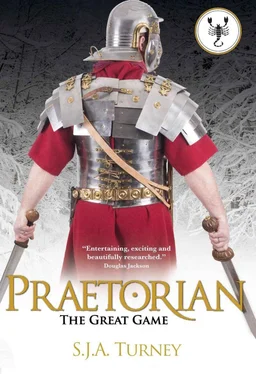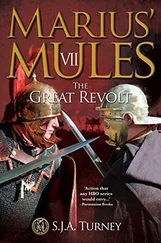S.J.A. Turney - The Great Game
Здесь есть возможность читать онлайн «S.J.A. Turney - The Great Game» весь текст электронной книги совершенно бесплатно (целиком полную версию без сокращений). В некоторых случаях можно слушать аудио, скачать через торрент в формате fb2 и присутствует краткое содержание. Год выпуска: 2015, Издательство: Mulcahy Books, Жанр: Исторические приключения, на английском языке. Описание произведения, (предисловие) а так же отзывы посетителей доступны на портале библиотеки ЛибКат.
- Название:The Great Game
- Автор:
- Издательство:Mulcahy Books
- Жанр:
- Год:2015
- ISBN:нет данных
- Рейтинг книги:4 / 5. Голосов: 1
-
Избранное:Добавить в избранное
- Отзывы:
-
Ваша оценка:
- 80
- 1
- 2
- 3
- 4
- 5
The Great Game: краткое содержание, описание и аннотация
Предлагаем к чтению аннотацию, описание, краткое содержание или предисловие (зависит от того, что написал сам автор книги «The Great Game»). Если вы не нашли необходимую информацию о книге — напишите в комментариях, мы постараемся отыскать её.
The Great Game — читать онлайн бесплатно полную книгу (весь текст) целиком
Ниже представлен текст книги, разбитый по страницам. Система сохранения места последней прочитанной страницы, позволяет с удобством читать онлайн бесплатно книгу «The Great Game», без необходимости каждый раз заново искать на чём Вы остановились. Поставьте закладку, и сможете в любой момент перейти на страницу, на которой закончили чтение.
Интервал:
Закладка:
Barely was the assembly complete before the centurions began to bellow out calls and the buccinae blared again, the legion turning to move off by cohort and century in full parade form and at a slow march toward the gathering.
Slowly, with a sedate and impressive pace, eagle, flags and standards glinting and fluttering, the Tenth Gemina filed out of the great gate of the headquarters, along the Via Principalis and out of the fortress. The legatus and his tribunes led the column, riding immaculately-groomed horses, their cloaks flapping in the breeze, each cohort and century following on in line.
As the legion traversed the causeway that crossed the fortress’ defensive ditches and moved into the street of the civil settlement, folk leaned out of windows and doors and cheered. Families stood beneath the wooden verandas of their buildings watching with awe and glee as the victorious Tenth passed by. Out of the corner of his eye, before they fully emerged from the defences and into the street, Rufinus caught sight of another legion marching across the open ground before the fortress, having just crossed the river. That was either the First Adiutrix or the Third Italica: the two legions encamped within the land that would soon become the province of Marcomannia, across the Danubius.
Every part of the emperor’s glorious army was parading today.
Past houses and tabernae, workshops and stables they marched to the cheers of the crowd, boots churning the endless slush and slurry of the streets, eyes on the sky, praying to a hundred different Gods to hold the weather off until they had returned to the cover of the barracks.
Past the new gleaming marble temple of Roma and Victory they marched, past the temple of Epona: a Goddess worshipped almost exclusively by the indigenous folk and cavalry troopers, past the animal market, the great granaries, the infamous ‘Grape Field’ tavern than had robbed so many soldiers of their pay and their senses in varying degrees, past the side road to the main docks with its endless stream of heavily-laden carts and wagons: past the thriving heart of civil Vindobona.
Finally, ahead stood the high, gracefully arched exterior of the new theatre, not yet opened, though nearing completion and due to be dedicated to the glorious name of Marcus Aurelius in Aprilis. Yet another avenue of celebration for the final quashing of the tribes across the river.
At the edge of Vindobona, the theatre stood some thirty feet high in its most complete section, covered with wooden scaffolding and hanging ropes like a shredded spider web. The wooden boards and platforms were packed with workers and civilians all trying to get a view of the great parade ground that had been designated on the wasteland opposite, the snow shovelled off early in the morning in preparation.
Already three of the legions had arrived at the great space and were standing to attention. Crowds of civilians heaved and jostled at the periphery, occasional over-excited members leaning out toward the assembled soldiers, though none were stupid enough to actually approach the army. This may be a great parade and spectacle, but every man and woman in Vindobona knew quite well how battle-hardened and prepared for trouble the assembled forces were. With the emperor present, even the slightest move forward from the crowd could be construed as a potential threat and the Praetorians were prepared to deal with any such infraction.
The imperial family, along with the senior commanders and a few of the more important civil officers in the city stood on a raised wooden dais at the riverward side of the ground, backed by a palisade that displayed trophies of captured Marcomannic and Quadi weapons, armour and shields, all interspersed with expensive furs.
The personal slaves of the most important attendees stood patiently at the foot of the platform, looking for all the world like a human shield between the nobles and the massed ranks of the legions. Rufinus tried, as he moved into position, to spot a certain young lady among them, but they were too numerous and distant.
Two groups of captive enemy noblemen stood chained, defeated and dejected, at each end of the great podium, on display for the public to jeer and spit at, Praetorians with drawn weapons watching them keenly. The braver of the townsfolk threw rotten vegetables at the fallen Quadi and Marcomanni warlords, even small stones. Only the braver, though, for the possibility of accidentally striking one of the Praetorian guards was ever-present.
In addition to the Praetorians on the platform, guarding the prisoners and gathered in small contubernia at strategic points for crowd control, the bulk of the guard surrounded the entire structure and its occupants: gleaming white forms, attentive and impressive, alert for any threat to their emperor and his companions.
Slowly and with stately pace, the Tenth moved to its assigned position and, as he gratefully came to a stop, settling his shield into position along with the rest, right hand by his side, Rufinus scanned the area. The sound of the crowd cheering and shouting back away from the assembled troops, some sitting in precarious positions on the scaffolding, managed to almost drown out the creaks and clanks of the assembled legions. As the last men of the Tenth moved into place, already the Third Italica was visible between the buildings back on the main street as they moved toward the assembly.
The imperial family stood on the platform, their feet at shoulder height to the men. Lucilla and her husband had contrived somehow to look even more irritated and bored than they had that evening in the headquarters, while Aurelius and his son stood in full armour, glittering and impressive. Close by, Paternus watched the assembling units with a professional eye, while tribune Perennis stood at his shoulder with his usual glower.
The assembled legionaries watched their co-emperors with a sense of awe and respect that was almost palpable, much as Rufinus had always done. The men of the legions saw only a great gesture of unity and the tight imperial family bond, as Commodus turned to his father and clasped his wrist in the age old gesture of comradeship, leaning in to speak in his father’s ear. Rufinus, his eyes now opened to the truth, had seen not a gesture of family closeness, but a desperate move of support. Doubtless none of the ordinary soldiers had noticed the slight stumble in the emperor’s step and the look of concern that briefly passed across Commodus’ face as he moved in to prevent his father from falling.
Strangely, while Paternus seemed to have noticed the stumble and had turned his concerned gaze on his master, Perennis, at his shoulder, shot a look at the back of Paternus’ head that was filled with so great a malice and hatred that Rufinus was amazed no one else seemed to have spotted it. Did he loathe his commander that much ?
As the remaining legions moved into position on the square, followed by the few auxiliary units that had been granted the privilege of sharing in the parade, Rufinus kept his keen gaze locked on the dais.
The emperor had quickly recovered and was smiling at his legions, though Commodus never moved more than a foot or two from his father’s side, keeping his hands free and his arms unfolded in case he might need to make a quick move. In a similar manner, Paternus had straightened his own arms and his fingers flexed regularly as though he too were prepared to make a desperate lunge for the emperor.
Tribune Perennis continued to flick his evil gaze to and fro, occasionally fixing it on a man who somehow especially irked him. Rufinus found himself staring at the second in command of the Praetorians, trying to weigh him up.
Initially, he had thought that the man simply coveted Paternus’ position and harboured a grudge. The more he watched, however, the more he was beginning to come to the conclusion that there was no special enmity between the two Praetorian officers, but more that Perennis simply hated everyone on a roughly equal basis, and was incapable of forming anything other than a disapproving frown on those sour features.
Читать дальшеИнтервал:
Закладка:
Похожие книги на «The Great Game»
Представляем Вашему вниманию похожие книги на «The Great Game» списком для выбора. Мы отобрали схожую по названию и смыслу литературу в надежде предоставить читателям больше вариантов отыскать новые, интересные, ещё непрочитанные произведения.
Обсуждение, отзывы о книге «The Great Game» и просто собственные мнения читателей. Оставьте ваши комментарии, напишите, что Вы думаете о произведении, его смысле или главных героях. Укажите что конкретно понравилось, а что нет, и почему Вы так считаете.












